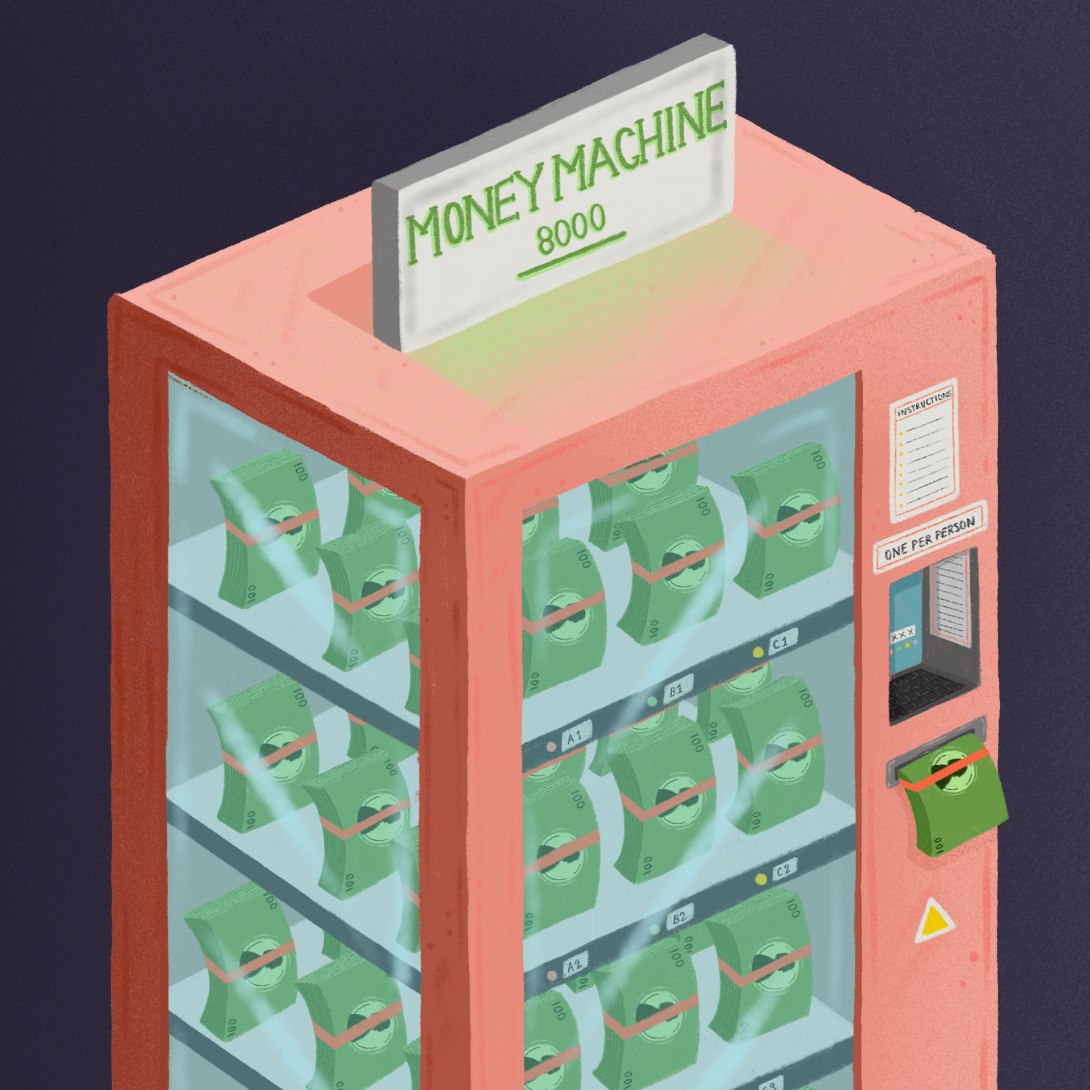Words by Edward See Yuen Wong Art by Emma Lucas
Universal Basic Income (UBI) – an unconditional salary to satisfy an individual’s basic living requirements that is paid for by the state to every citizen regardless of their employment status.
Who the f**k would say no to free money and the end of work?
Not since the publication of Karl Marx’s ‘Communist Manifesto’ has the world been entranced with an idea controversial enough to change the way we perceive money and value. Does this mean that we can now get paid to play the latest World of Warcraft expansion game whilst artificially intelligent machines do all the boring work for us? Has humanity developed a revolutionary new financial system that seeks to redistribute income to address income inequality? Shall we all just become freelancers and specialise in what we love most amidst the ‘new gig’ economy now we don’t have to worry about feeding ourselves?
Whatever your stance is on UBI, the only truly ‘universal’ element about the concept is its ability to engage us all in heated, passionate arguments where we discover how low-key ‘libertarian’ or ‘right-wing’ we are. Hey if Elon Musk and Zuckerberg say it’s cool, surely UBI deserves ‘some’ of our attention, right?
Interestingly, UBI isn’t as new as the progressive ‘Viking’ countries (cough, cough Finland) make it out to be. The ‘60s wasn’t just about Woodstock, The Beatles and the Vietnam War. It also saw the proliferation of ideas from liberal economists like Milton Friedman who dared question whether humanity was inherently greedy or whether the invisible hand of capitalism has forced us to conform to a culture that glorifies profitability over compassion, with his theories on market capitalism. President Nixon nearly introduced his version of UBI to combat economic recession that plagued the ‘70s with his basic income plan. So, this free money idea? Could it work?
The current state of Australia’s social welfare system is plagued with inefficiencies that go against the very purpose of what it was established to accomplish. Centrelink and Medicare prioritises allocating funds to support individuals who were in full or permanent part-time positions. However, given the paradox of a decreasing participation rate – people giving up on finding employment – and overeducated millennials working multiple jobs in what is commonly described as the ‘gig economy’; many today may not even qualify for additional income support. UBI would then introduce a revised model of welfare distribution that is free from discrimination. Could UBI alleviate these ‘inbetweeners’ from descending into a poverty trap?
How many of us are shackled by ‘golden handcuffs’ working in jobs we hate just to pay the rent? Now if you hate what you do, chances are you’ll probably suck at it. Under the terminology of ‘right-wing’, diehard fans of capitalism; doesn’t this spell out a classic case of market inefficiency? Perhaps with UBI, I won’t have to worry whether I’ll starve whilst I freelance for whoever I want whenever I want. Perhaps we finally have a conceptual framework to redefine what meaningful work means in our postmodernist, materialistic society? After all, Confucius did say that if you love what you do, you’ll never have to work a single day in your life.
Imagine a world without Nike sweatshops? UBI could help increase worker rights by granting them the freedom to leave exploitative jobs since they know that they have access to basic food and shelter. This then exerts additional pressure on multinational corporations to ensure that their employees are being adequately compensated.
Whilst these utopian ideals may be enough to start revolutions, my writing would be graced with the same candour and finesse as Andrew Bolt’s opinion pieces if I did not address the challenges of implementing UBI. Like every pet project you got mum and dad to pay for, someone’s going to have to pay for it. According to Pete Whiteford from ANU, a UBI system set at the level of the age pension that is paid to 18 million Australians would cost approximately $360 billion a year, roughly 5-10% of our gross domestic product. If history has taught us anything, it’s that governments will raise marginal income tax rates as opposed to the corporate tax rate to fund a new project. Does this mean that the government will cut funding for the NDIS, Aged Care or education to pay for UBI? Then there’s the issue of whether everyone will use UBI optimally or whether that Wall-E scene where everyone is glued to their seats and electronic devices becomes reality?
Ultimately, humans derive purpose from having meaningful work. The way we define work constantly evolves to reflect our changing values. Whilst the notion of free money and the end of work is appealing, it’s still an uphill battle to implement such a radical policy in Australia. Time will tell whether the future of work is truly, universally, “free”
